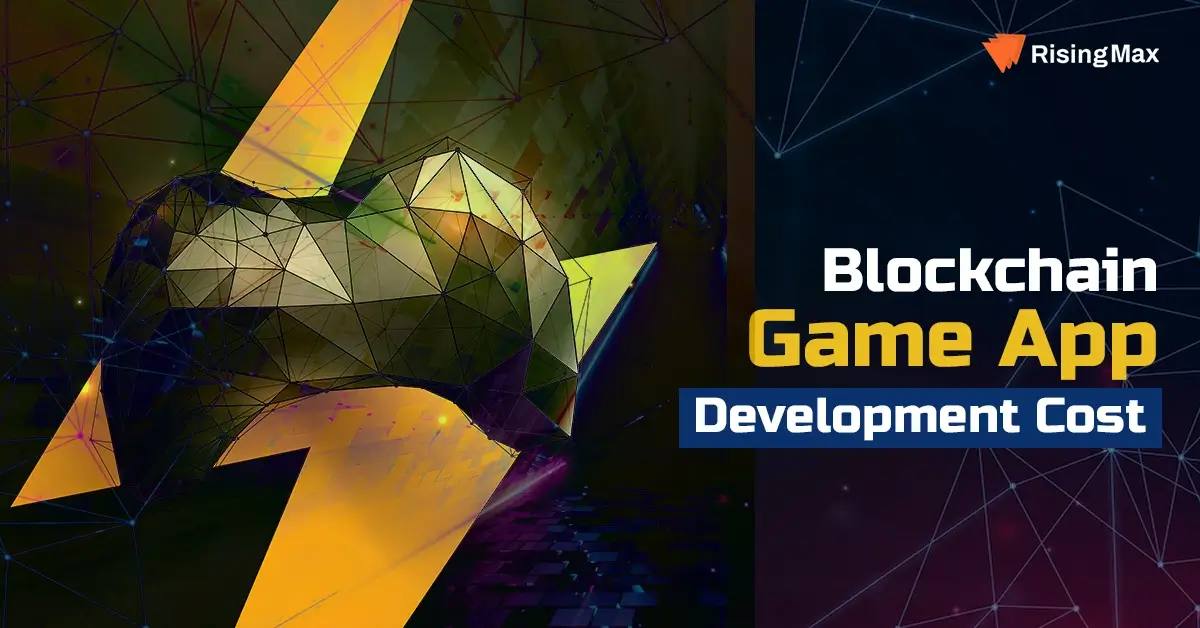In the past few decades, the video game industry has witnessed major changes, mostly due to the arrival of new concepts such as play to earn. Play-to-earn or P2E gaming model works on blockchain, crypto, and NFTs to transform the traditional gaming concept into play-to-earn.

The flexible and dynamic nature of the gaming industry has fostered the shift from a pay-to-play to a play-to-earn model. As of 2024, the global P2E market has significantly grown and continues to expand, demonstrating the increasing plat to earn market size and popularity of the P2E business model.
With p2e games, like Axie Infinity and Decentraland generating millions of dollars in revenue, attracted investors worldwide. If you feel like launching your own p2e game to enter the million-dollar gaming industry, but do not know where to start, then our team at RisingMax Inc. is happy to help you. Reach out to our expert game developers to discuss your business idea, and we will assist you with the development & how to generate revenue from P2E games.Before delving deep, let’s start from the basics first and understand play-to-earn games.
What Are Play To Earn (P2E) games?
Play-to-earn or P2E games, as the name suggests, are games that allow players to earn rewards such as NFTs, game tokens, money, etc. Players will get rewards based on their performance or level in the game. Players can even challenge each other in PvP matches and earn game rewards.
The in-game assets can be traded with other players or on a secondary NFT marketplace to earn real-world currencies. The use of blockchain technology makes the entire ecosystem completely secure and transparent for players.
Are you fascinated to know how the entire play-to-earn game ecosystem works? Then, keep on reading this post till the end. We will discuss the P2E game business model, play to earn market size, P2E business opportunity, and basically everything related to the play-to-game economy.
Play to Earn Game: Three Main Pillars
When it comes to play-to-earn games, they operate on three main pillars. On a closer analysis, these are the same pillars on which earlier traditional games stand up in the market. P2E games are expanding and dominating the gaming sector with the same fundamentals as free-to-play games.
Marketability – This is one of the most important factors determining a play-to-earn game’s success. When the associated marketability factor with a game is high, the user acquisition cost will be low, boosting the game’s potential market.
Monetization – This factor directly impacts the revenue generation of a play-to-earn game. This determines how likely a player will make a purchase and how much they are willing to spend. The higher the game’s monetization factor, the higher will be the revenue generation keeping in mind that the game keeps players engaged.
Retention – This is one of the most crucial factors that measure how likely a player will stick to a game and keep on playing. The higher retention rate of a game ensures higher revenue as players will return daily.
The success of a play-to-earn game depends on all these three pillars, and a balance is needed between them. Since the play-to-earn gaming economy is still nascent, another pillar might come into play.
Play-to-earn (P2E) Games Business Model
Play-to-earn (P2E) games come with their in-game assets, NFTs, and digital game coins. Players can earn these in-game assets based on player levels or tasks completed within the game. The game will reward players with game tokens and NFTs based on their performance.
Even though the games are free to use, integrating blockchain technology and the creation of NFTs opens up revenue generation options. Players can either earn these rewards or buy them from the secondary marketplace. Players can earn in-game assets with PvP battles or complete game tasks. In addition, players can earn more in-game digital assets such as NFTs and tokens by staking them for a fixed duration.
Later, players can trade or sell them to other players for real-world money. All the game NFTs use smart contracts to ensure every time there is an NFT sale, the original creator will earn royalty. In-game NFTs or tokens can also be traded on secondary marketplaces in exchange for real-world currency.
In this way, play-to-earn (P2E) games generate revenue for the investors while giving equal opportunities for players to earn.

Play To Earn Gaming Economy: P2E Market Size
By 2026, the global blockchain gaming market size has seen substantial growth, indicating the increasing acceptance of this model. Here are some recent statistics:
- In 2022, the global market for Play-to-Earn NFT games had a substantial valuation of around USD 3,292.73 million. Experts’ racing game market forecast focus on strong growth for the Play-to-Earn NFT games market. With an expected CAGR of nearly 17.93%, the web3 gaming market size is projected to reach USD 8,856.95 million by 2028. (Yahoo Finance)
- The global video game market worldwide is expected to reach the 200 billion US dollar mark in 2026. (Statista)
- The worldwide market for blockchain in gaming is projected to surge to an impressive $301.53 billion by 2030. This growth represents a robust compound annual growth rate (CAGR) of 68.3% from 2023 to 2030. (businesswire)
- In 2022, each user on average generated revenue of $99.45 in the global gaming sector. This is significantly higher than the average revenue of $10.95 per user from the sale of physical video games. (Statista)
- In 2022 the worldwide p2e gaming market size was around 347 billion US dollars, and mobile gaming was the star performer, accounting for $248 billion of this figure. (Statista)
P2E Business Opportunity: Types of Play-To-Earn Games
Metaverse P2E Games
Metaverse games open up new business opportunities for investors and revenue generation options for players. Players can leverage virtual environments to play, create, and own digital in-game assets. Top performing metaverse P2E games include Decentraland, Sandbox, Alien Worlds, etc.
Trading Cards Games
The uniqueness and rarity of NFT trading cards open up a huge business opportunity for investors. With limited, rare, and unique NFT trading cards, investors can launch new trading card games. Players can earn these cards in the game and trade them on secondary NFT marketplaces to earn real-world money. Popular trading card games include Gods Unchained, Splinterlands, Sorare, Skyweaver, etc.
Role-Playing Games (RPG)
Role-playing or RPG games are getting popular as they empower users to enjoy unique game experiences with in-game weapons, avatars, and skills. Unlike traditional games, RPG games are integrated with in-game assets such as NFTs, skins, weapons, and others. The different subgenres of RPG games, such as action-based, multiplayer, and others, make them widely popular among the masses. Popular P2E role-playing games include Axie Infinity, Blankos Block Party, etc.
Investing in the gaming industry is the best business idea as racing games market share is increasing day by day.
Rationale That Supports Racing Game Market Growth
Engage Wider Audience
One of the biggest reasons for the rapid growth of the play-to-earn gaming economy is that players can convert in-game assets into money. This unique feature of P2E games attracted even non-gamers as now they can earn game rewards such as NFTs and cryptocurrencies. This resulted in a huge racing games market growth and engaging a wider audience.
Limited Marketing
The rising popularity of blockchain added to the popularity of play-to-earn games. As these games provide players with an opportunity to earn real-world money, many streamers pay special attention to them. Thus creating a buzzword for these games and allowing promoters to engage with wider audiences with less marketing budget.
Higher ROI
In-game assets such as NFTs, game tokens, skins, weapons, and others can be traded on secondary NFT marketplaces. Investors can buy these game tokens from these secondary fractional NFT marketplaces and generate higher ROI with the game’s popularity.
Earning Opportunity
Play-to-earn games provide users with a great opportunity to earn real-world money while playing their favorite games. The in-game assets earned can be traded on a secondary NFT crypto trading platform for real-world currencies.
Game Token Ownership
When a game loses popularity or is shut down, the in-game assets seem useless. However, with blockchain-based p2e games, there’s no need to worry about the same. The in-game tokens of one game can be used to trade, buy, or play another game, giving the player complete ownership and a lifetime asset.
Transparency
The integration of blockchain technology ensures high security and transparency within p2e games. While playing p2e cards or RPG games, players are assured of a high level of transparency. Blockchain eliminates or minimizes the risk of fraud or cheating when playing multiplayer games online.

Top Play-To-Earn Games In The Market: Racing Games Market Trends
The rising popularity of play-to-earn blockchain games resulted in the emergence of groundbreaking p2e game projects and the same can be expected in the future. Proponents believe that the p2e games will dominate the gaming industry’s future and hold the biggest share in the years to come. But for now, let’s have a look at some of the top-performing p2e games in the market.
- Axie Infinity
This Ethereum-based blockchain game became the first p2e game to generate 4 billion US dollar sales. The p2e empowers players to earn, create and breed in-game tokens that later can be used in battles. Players can sell Axie Infinity Tokens (AXS) for real-world money.
- Silks
Silks is a unique p2e game that is getting popular among players for providing ground breaking game experience. It is a real-world horse racing game where each horse represents an NFT based on performance, training, and results. Players can earn new in-game rewards based on their racing games and results. The concept of virtual horse racing gained traction among players making it one of the most popular games in its category.
- Splinterlands
The next top performing play-to-earn game is the customized card game “Splinterlands”. Splinterland is a strategic card game with more than 800 NFT cards. Daily more than 280,000 players join this strategic card game to earn new game rewards and assets. The game is popular in more than 140 countries and multiple languages.
- Alien Worlds
Alien Worlds is another popular game in the play-to-earn category. The game consists of five virtual worlds, each containing 500 virtual plots. Players can fight, colonize plants, and set up a virtual economy. The players have been rewarded with Trillium, an in-game currency, and can be staked to earn more rewards.
- Farmers World
Farmers World is a play-to-earn game that is highly engaging and works on blockchain technology. Players can purchase tools, build farms, select farming tools, and build a virtual economy. The game rewards players based on the task they have accomplished and encourages an advanced farming ecosystem.
These top five best-performing p2e games have paved the way for a bright future of play-to-earn games. Planning to launch your own unique play-to-earn game? Then our experts at RisingMax Inc are ready to assist you. With our development expertise, we can build an engaging game based on your business idea that helps you dominate the gaming industry's future.What Does The Future Hold For Play-To-Earn Games?
There is no denying that the prospect of earning money while playing your favorite video game has attracted many game players to p2e games. However, most game studio startups and developers are reluctant to join play-to-earn due to the slow backend nature of blockchain technology. On top of it, the integration of blockchain technology within an existing game is not an easy task.
Gaming studios such as Ubisoft and Unreal Engine have made it easy for developers to integrate digital assets into games. The future looks bright for p2e games as they are engaging and present a revenue generation opportunity to players.
Just like a pay-to-play model and subscription-based games, the p2e games will create a place of their own and a dominant business model in the gaming ecosystem.
Also Read: Unreal Engine 5 Game Development
Why Choose US As A Play-to-Earn Game Development Partner?
RisingMax Inc. has been offering IT development services to businesses worldwide with a pool of software experts. As a leading web3 game development company, we have built more than 15 NFT and AR/VR games for our clients. Our customers leverage our in-depth knowledge and expertise in game development to build engaging and highly secure games.
Here is why you should hire RisingMax Inc;
- Unmatched game development services
- Cost-effective solutions
- Tech prowess
- Bug-free and scalable p2e game
- Certified and experienced game developers
- Transparent pricing
- 24*7 customer support
- FREE consultation services
Don’t let your innovative play-to-earn game ideas wait. Hire our blockchain game developers and give wings to your unique game business idea.
Connect over a FREE consultation and discuss your p2e game project TODAY.














